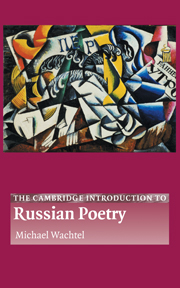Book contents
- Frontmatter
- Contents
- Preface
- Acknowledgments
- Note on translations and transliterations
- Introduction
- Part I Concepts
- Part II Interpretation
- Chapter 4 From the ode to the elegy (and beyond)
- Chapter 5 The ballad
- Chapter 6 Love poetry
- Chapter 7 Nature poetry
- Chapter 8 Patriotic verse
- Conclusion: poetry and pattern
- Bibliography
- Suggested further reading
- Index of poetic terms
- Index of names and works
Chapter 7 - Nature poetry
Published online by Cambridge University Press: 05 June 2012
- Frontmatter
- Contents
- Preface
- Acknowledgments
- Note on translations and transliterations
- Introduction
- Part I Concepts
- Part II Interpretation
- Chapter 4 From the ode to the elegy (and beyond)
- Chapter 5 The ballad
- Chapter 6 Love poetry
- Chapter 7 Nature poetry
- Chapter 8 Patriotic verse
- Conclusion: poetry and pattern
- Bibliography
- Suggested further reading
- Index of poetic terms
- Index of names and works
Summary
Ду́ма за ду́мой, волна́ за волно́й,
Два́ проявле́нья стихи́и одно́й.
Тютчев, «Волна́ и ду́ма»Thought upon thought, wave upon wave,
Two manifestations of the same element.
Tiutchev, “Wave and Thought”The term “nature poetry” itself connotes two distinct yet related realms: the human subject and the natural object, the observer and the observed. Like landscape painters, nature poets do not simply reproduce what they see, but filter it through their own consciousness. The prominence of the observer varies considerably from painting to painting and from poem to poem. It may be foregrounded or reduced, but never obliterated. Even the photograph, that most mimetic of art forms, cannot offer an unmediated view of nature, if only because a photographer necessarily selects one piece out of reality at the expense of others.
Of course, poets and painters rarely aspire to the degree of verisimilitude of a photographer. Nor do we expect them to render a scene “precisely as it is.” It would be absurd to study the landscapes of Vincent Van Gogh or Caspar David Friedrich as a means of understanding the topology and climate of southern France or northern Germany. On the contrary: these works fascinate as much through their creators' strength of personality as through the scenes they depict. In a similar way, nature poetry tends to refract rather than reflect the landscape. These poems are often less pictorial than contemplative and associative.
Like love poetry, nature poetry cannot be defined by formal markers.
- Type
- Chapter
- Information
- The Cambridge Introduction to Russian Poetry , pp. 110 - 126Publisher: Cambridge University PressPrint publication year: 2004

